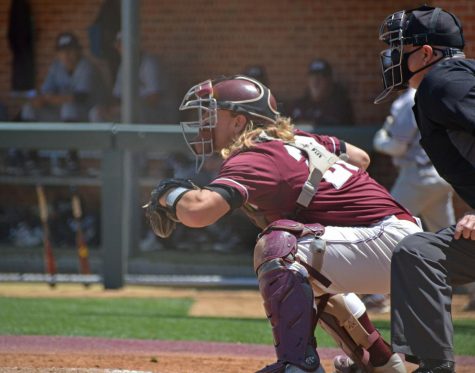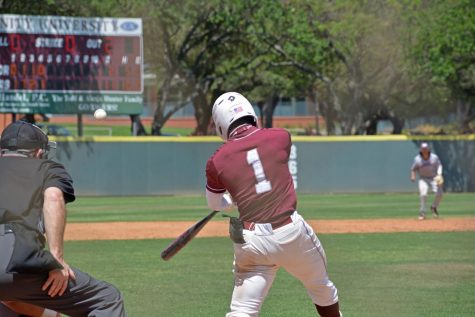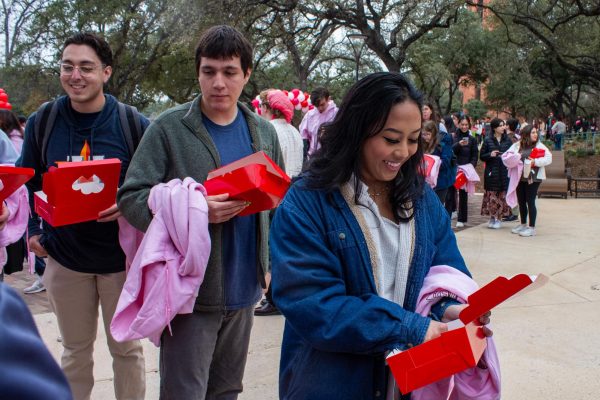Transfer players help Trinity’s baseball team dominate NCAA Division III
Various roads led to becoming a Tiger for Pettit, McDonald among others
Senior pitcher James Nittoli prepares for a possible appearance out of the bullpen. Nittoli came to Trinity after starting his career at The University of Texas at Austin.
A Wildcat, Husky, Cardinal, Puma, Panther, Longhorn and a couple of Spiders are all Tigers today. “How is that possible” you might ask. The answer is simple: the National Collegiate Athletic Association (NCAA) transfer portal, a tool that has been utilized extensively by Trinity’s baseball program to put together one of the most talented teams in school history.
Assistant Coach Andrew Waters currently serves as the recruiting coordinator for the baseball program, scouting and communicating with high school players who could potentially join the program. But Waters is also responsible for monitoring the NCAA transfer portal, which he calls “a great tool that the NCAA came up with for student-athletes.”
The portal debuted in 2018 and serves a concise purpose: to simplify what was previously a very complicated process. In the past, players and administrators were required to complete a number of tasks that could take hours, days, or perhaps even months. Advancement in technology and the creation of the portal have helped speed up these processes to ensure that all players have the opportunity to go to school and compete athletically in a situation that they think is right for them.
So far, the portal has helped many athletes relocate, but Waters still describes the process as somewhat of a “crapshoot.” For the Tigers, the success that they have found using the portal can partially be attributed to luck, beyond anything else.
“All of them have their own specific story about how they just kind of showed up and fell in our laps,” Waters said.
Catcher Tyler Pettit, for example, was playing Division I baseball less than a mile away at the University of the Incarnate Word, and Waters already had a connection to their coaching staff. Outfielder Evan McDonald was almost 200 miles away at Prairie View A&M University but had considered Trinity during his original recruiting process and circled back around when he made the decision to transfer.

Pettit committed to Incarnate Word late in the recruiting process. He impressed at the state tournament with Round Rock High School during his senior year of high school and agreed to walk on for the Cardinals the next year. He did much more than that in his first year with Incarnate Word, starting in 33 games at catcher. But in his second year, he saw his playing time diminish behind a freshman All-American.
“I knew that I didn’t want to be stuck behind that… and then it just so happened that whenever I was talking to the coaching staff about it, I found out they had gotten the offer from UTSA, and they were planning on taking it. Just those two things combined, I was already planning on leaving and then the fact that the reason that I enjoyed being there, with the coaching staff going just kind of sealed it,” Pettit said.
For McDonald, motivations were a bit different. He was recruited by Tulane University out of high school and had closed his commitment rather early. Plans changed when then head coach David Pierce took the head coaching job at the University of Texas. McDonald decommitted from Tulane and reopened his recruiting. He landed at the San Jacinto College North Campus before transferring to Prairie View A&M, a historically Black college and university (HBCU) located in Prairie View, Texas.
“When I had originally committed, it seemed like the school was on a climb, like we’re getting better and better. When I got there, I expected the program to be run a lot better than it was, a lot more organized than it was,” McDonald said.
He added that they were playing five games a week and, as a smaller program, were often being asked to travel. His decision to transfer came around the same time as the Southwestern Athletic Conference (SWAC) Tournament.
“We were going to spend like a week traveling to other places. I guess it was the same week as finals, and I still had a lot of exams I had to make up from early on. I just basically said to the coaches, ‘This isn’t going to be beneficial for me.’ I hadn’t played in about two, three weeks, not even getting an at bat. So I told [them] I was putting my name in the transfer portal, and I was just going to finish my semester as a student at Prairie View,” McDonald said.
Each player had a different reason as to why they were looking to transfer, but no matter the motivation, the NCAA Transfer portal gives athletes an opportunity for a fresh start. For Trinity, it provided an opportunity to fill positional needs and to build an even stronger team.
“There’s a reason why those kids were offered an opportunity at a higher level to begin with. Our standpoint is if we can get a guy that, for whatever reason, it didn’t work out in Division I or II … we want them because they’re probably just a notch better than the guys we can recruit right out of high school,” Waters said.

Fifth-year senior outfielder Rafe Chaumette shared a similar sentiment.
“It’s too great of an opportunity not to jump on. And if everybody else is doing it and you’re not doing it, you’re behind. There’s so many great, amazing baseball players out there that are looking for somewhere to play,” Chaumette said.
Many of those players have found a new home at Trinity. Pettit has assumed the role of starting catcher, bringing reliable defense behind the plate game in and game out as he handles a deep pitching staff. He also adds a high quality bat to the lineup, boasting an offensive split of .327/.465/.442.
McDonald provides an offensive spark for the Tigers as they navigate Southern Collegiate Athletic Conference (SCAC) action, and he will also look to fill some impending departures from the Trinity outfield moving forward.
There are a number of other transfer players who have made an impact for the Tigers this year, including Brian Schuab, an outfielder from the University of Richmond, who is currently hitting with a split of .338/.577/.815. Schaub also leads Division III with 28 walks on the year.

Michael Herrera, a shortstop previously at Abilene Christian University, hits second for the Tigers and plays what is arguably the most important defensive position in the game. James Nitolli, a fifth-year senior that transferred from the University of Texas, has amassed a sensational career since transferring, currently boasting numbers like 164 career strikeouts, and an earned run average of 3.42 through 187 innings of work. And this list goes on.

But as incredible as it has been for these players to have been granted a second opportunity and a fresh start, the program is just as thankful.
“I think about this team, right now, as well as we’ve been playing, and I think about us without transfers. We would have holes,” Chaumette said.
Chaumette thinks that at times the transfers’ impact is overlooked, as if they had been here all along. No one seems to mind, though, as the transfers don’t look to stand out from the rest of the team. There is one shared goal: win a national championship. McDonald and Pettit recognize this and look to simply do their jobs, to the best of their ability, and let the rest fall into place.
For McDonald, it is to be loose, lighthearted and ultimately to have fun while playing baseball. He recognizes that was something that was missing for him during previous experiences, and wants to make sure that it’s something that no one misses out on in this program. But more than that, he said that he likes “to think that the attitude means something. That it’s something that people can get behind.”
For Pettit, he recognizes the talent that exists within this Trinity program and feels that it is comparable to what he saw at the Division I level. However, he also acknowledges that at this level, you can get away with more when the team you play against is not always on your same level, or you might not have teammates on the bench threatening to take your spot in the lineup. He says his goal is to “not let their competitiveness fall because there is not something pushing them … I feel if I can hold a guy to a standard higher than the Division III level, that really helps.”
No matter the approach being brought by the transfers, it is clear that it is paying off for this Tiger team. They hold a 19-2 record with an 8-1 mark in conference play, good enough to find themselves in first place halfway through SCAC play and atop Division III baseball as recently as April 4.
More importantly, though, is the impact the NCAA transfer portal has made, allowing thousands of athletes to relocate, including a handful of new Trinity Tigers who feel that they have found the place that they were meant to be all along.

Having grown up in San Antonio, sports have always been especially meaningful to me, in the opportunities that I had playing but also in the way teams...

My name is Claire Sammons and I am an Anthropology and Communications double major. I have worked for the Trinitonian since fall of 2020. I became a photographer...








